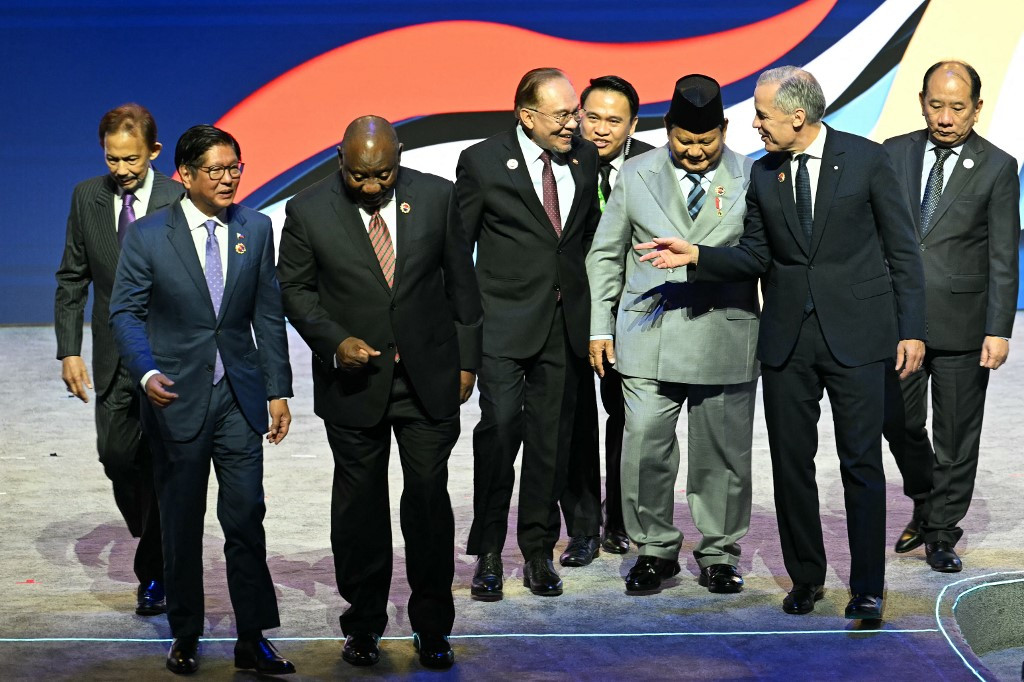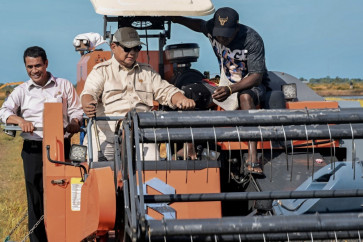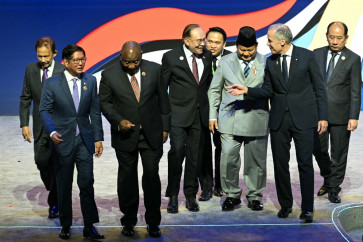Popular Reads
Top Results
Can't find what you're looking for?
View all search resultsPopular Reads
Top Results
Can't find what you're looking for?
View all search results47th ASEAN Summit: A paradox of diplomacy and delay
While hailed as an overall success, the regional bloc's summit last month demonstrated that its major stumbling block is speed in implementing the various declarations and statements it so loves to issue.
Change text size
Gift Premium Articles
to Anyone
 President Prabowo Subianto (third right) listens to Canadian Prime Minister Mark Carney (second right) as Malaysian Prime Minister Anwar Ibrahim (center) looks on, while Philippines President Ferdinand Marcos Jr (second left) speaks with South African President Cyril Ramaphosa (third left) on Oct. 26, 2025, as world leaders exit the stage following the opening ceremony of the 47th ASEAN Summit in Kuala Lumpur. (AFP/Mohd Rasfan)
President Prabowo Subianto (third right) listens to Canadian Prime Minister Mark Carney (second right) as Malaysian Prime Minister Anwar Ibrahim (center) looks on, while Philippines President Ferdinand Marcos Jr (second left) speaks with South African President Cyril Ramaphosa (third left) on Oct. 26, 2025, as world leaders exit the stage following the opening ceremony of the 47th ASEAN Summit in Kuala Lumpur. (AFP/Mohd Rasfan)
I
n many ways, the 47th ASEAN Summit and Related Summits last month in Kuala Lumpur looked like a very successful event, a great platform to promote the centrality of Southeast Asia. Thanks to Anwar Ibrahim, prime minister of outgoing 2025 chair Malaysia, the ASEAN brand sparkled, highlighting how the region could be a source of stability in an era of geopolitical disruption.
The list of non-regional leaders who attended the summit from Oct. 26 to 28 was impressive: Brazilian President Luiz Inácio Lula da Silva, Canadian Prime Minister Mark Carney, Chinese Premier Li Qiang, European Council President António Costa, Japan’s newly installed Prime Minister Sanae Takaichi, South African President Cyril Ramaphosa and South Korean President Lee Jae-myung, along with United Nations Secretary-General António Guterres.
Trade was huge on the agenda. Both the ASEAN Trade in Goods Agreement (ATIGA) and the ASEAN-China Free Trade Area (ACFTA) were updated, representing huge gains for the economies of Southeast Asia. There was also the 5th Regional Comprehensive Economic Partnership (RCEP) Summit, which has massive potential though its implementation has been shaky so far.
And then, Timor-Leste finally joined the group. The fact that ASEAN has a new member that is a full-fledged democracy, despite its economic and poverty-related challenges, is also something that should be celebrated.
With Dili merely aligning with the business-as-usual status quo that reigns at ASEAN, I sincerely hope Timor-Leste can play a progressive and enlightened role in the bloc.
Up to here, the narrative that the ASEAN summit was a success remains solid, though other less discussed and less visible developments are worth mentioning.
The bloc has renewed its partnership with the UN with an agreement on a next cycle of actions from 2026 to 2030. Some positive progress has been made on the disability right agenda with the endorsement of the Path Ahead that operationalizes the ASEAN Enabling Masterplan 2025, on which the Mid Term Review was presented. There was also a new comprehensive road map for the elimination of child labor.


















